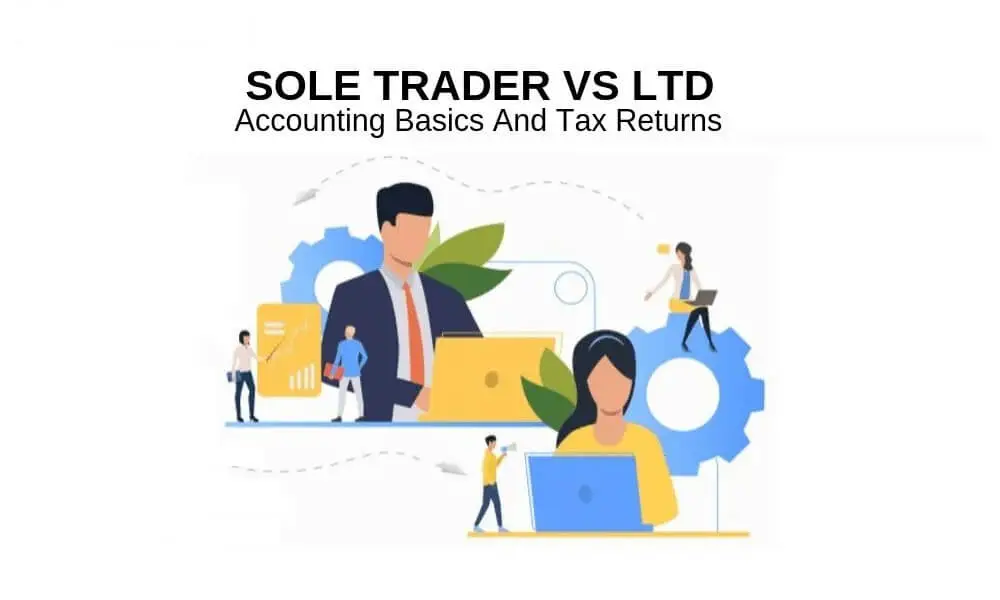Every business, regardless of size, needs a legal structure. There are three core structures of businesses: sole trader, partnership, or limited company.
According to 2020 data from the Department for Business, Innovation and Skills::
- 59% of businesses were sole traders (3.5 million),
- 35% were actively trading companies (2 million)
- 7% were ordinary partnerships (414,000)
So, most businesses are either sole trader or limited company. But what are the differences between the two, and does it matter which you choose to be?

What is a sole trader?
A sole trader is a person who is the sole owner of their business. This is not to be confused with someone who is self-employed. Self-employed means that you don’t work for an employer or pay tax through PAYE, whereas sole trader simply describes your business’s structure, whilst
The benefits of being a sole trader are:
- It’s the simplest business structure out there;
- It’s easy to set up via the gov.uk website (you’ll need to do this for tax purposes);
- There’s very little paperwork aside from a Self Assessment tax return; and
- It’s more private than incorporated businesses, who can be found via Companies House.
Being set up as a sole trader is probably the best option for people like landlords who choose to have either a singular property or a very small portfolio of properties. As simple as it may sound to be a sole trader, there are some drawbacks.
The disadvantages of being a sole trader are:
- Having unlimited liability – this means that there’s no legal difference between the sole trader and their business. So, if the business gets into debt, the business owner is personally liable for that debt. They can lose personal assets if things go wrong because of this liability.
- Limited opportunities for expansion as a sole trader, as banks and other investors tend to prefer limited companies which means that raising funds can be problematic.
- Tax rates can be higher for sole traders than limited companies. It might not be quite as profitable to stay a sole trader once a certain level of earnings is reached.
- Your business name isn’t protected – so technically, another person could set up their business with the same name (either as a sole trader or a limited company).
What is a limited company?
A limited company is a business that has its own legal identity, separate from its owners (also known as shareholders) and its managers (or directors). This is true even if it’s run by one person.
The benefits of being a limited company:
- A limited company is legally separate from its business owner, which means the owner has limited liability. This means personal assets aren’t at risk in the same way they are for sole traders – you only stand to lose what you put into the business.
- once a company name is registered. no one else can use it.
- The can be more profitable because they pay corporation tax on their profits instead of the higher rates that income tax imposes, which is generally more tax efficient than sole traders.
- There’s a wider range of allowable expenses and tax-deductible costs for a limited company to claim against its profits.
If we use landlords as an example, this is why if your long-term goal is to have a large portfolio of properties, or you wish to make it your primary career, setting up as a limited company
Therefore, it makes sense to assess your long-term goals for your business venture before deciding. For example, a landlord aiming to have a large portfolio of properties is likely best off choosing to set up as a limited company than a sole trader. Especially if the goal is to have it as a primary source of income.
Nonetheless, there are some drawbacks to consider.
Disadvantages of the limited company structure:
- More legal responsibilities – known as the director’s fiduciary responsibilities – which essentially outline what a limited company director must legally carry out.
- More costly and time-consuming because of the extra paperwork fiduciary responsibilities bring, which you either do yourself or hire an accountant for.
- More transparent – your business information, including director details and business earnings can be found publicly via Companies House.
- You will need to pay an incorporation fee.
How do you choose between a sole trader and limited company?
Ultimately, it depends on your capabilities, resources and future goals. It’s important to consider the impacts of being a sole trader or a limited company. A good thing to do if you’re unsure is consult an accountant, as their expertise will be valuable to you and help you make your decision.
This is where Warr & Co come in. We tailor our advice to your specific circumstances and take a firm no-size-fits-all approach to our services. This means that we can cater to a wide range of businesses, whether sole trader or limited company. Get in touch with us and book a free consultation to get started.











